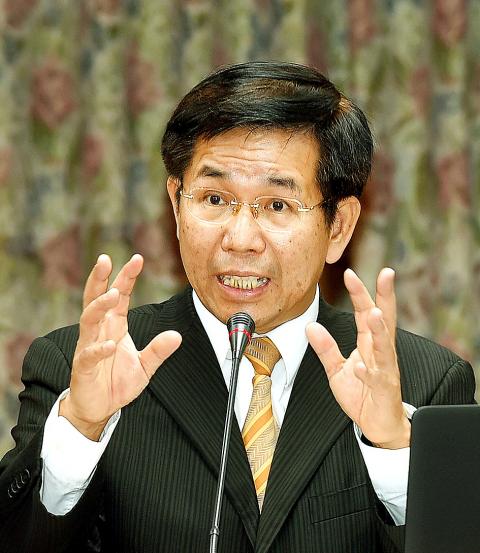Minister of Education Pan Wen-chung (潘文忠) yesterday resigned over what he said were political manipulations and slander directed at the ministry amid a months-long controversy surrounding the legality of National Taiwan University (NTU) president-elect Kuan Chung-ming (管中閔) heading the nation’s leading university.
Pan yesterday told the media that he had tendered his resignation to Premier William Lai (賴清德).
Although he is not one to fear challenges at work, he decided to resign after much thought, to curb “politically motivated attacks and slander” leveled at the ministry over the case, Pan said.

Photo: Fang Pin-chao, Taipei Times
The political manipulations had given ministry employees unnecessary stress and placed an uncalled-for burden on them, he said.
Kuan was on Jan. 5 elected NTU president, but his inauguration was postponed after he faced allegations of a conflict of interest in the election, plagiarism and illegally teaching in China as a government-contracted professor.
Throughout his career as a public servant, he always abided by the law, including in his handling of the controversy surrounding Kuan’s election, Pan said in the statement.
The ministry, as the university’s governing agency, is obligated to ensure that the election was entirely procedurally sound and that the NTU president-elect has the qualifications to assume the post, he said.
Despite the university discussing issues surrounding Kuan’s election in internal meetings, questions still remain, and the ministry would be negligent if it did not try to clear up these doubts, Pan said.
The university’s president has a high status in academia and should stand up to public scrutiny, he said, adding that Kuan has a responsibility to clarify controversy stemming from his “own behavior.”
Kuan’s reticence over questions raised about him runs counter to public expectations and the doubts have in turn made the ministry a source of public criticism, Pan said.
He said he hopes that all political manipulations surrounding the issue would cease following his resignation, so that public attention would focus on the legitimacy of the elections and Kuan’s qualifications.
Lai yesterday said that he “reluctantly” approved Pan’s resignation.
Hopefully, Pan’s resignation would help establish a socially acceptable standard for the election of university presidents, Lai said.
Lai said he admires and respects Pan’s work to clear up doubts over Kuan’s suitability, while acknowledging his contributions as a tenured educator.
The premier also conveyed the hope that Kuan would address the public over the allegations that he illegally taught in China, so that the controversy can be laid to rest.
Additional reporting by Lee Hsin-fang

CHAOS: Iranians took to the streets playing celebratory music after reports of Khamenei’s death on Saturday, while mourners also gathered in Tehran yesterday Iranian Supreme Leader Ayatollah Ali Khamenei was killed in a major attack on Iran launched by Israel and the US, throwing the future of the Islamic republic into doubt and raising the risk of regional instability. Iranian state television and the state-run IRNA news agency announced the 86-year-old’s death early yesterday. US President Donald Trump said it gave Iranians their “greatest chance” to “take back” their country. The announcements came after a joint US and Israeli aerial bombardment that targeted Iranian military and governmental sites. Trump said the “heavy and pinpoint bombing” would continue through the week or as long

TRUST: The KMT said it respected the US’ timing and considerations, and hoped it would continue to honor its commitments to helping Taiwan bolster its defenses and deterrence US President Donald Trump is delaying a multibillion-dollar arms sale to Taiwan to ensure his visit to Beijing is successful, a New York Times report said. The weapons sales package has stalled in the US Department of State, the report said, citing US officials it did not identify. The White House has told agencies not to push forward ahead of Trump’s meeting with Chinese President Xi Jinping (習近平), it said. The two last month held a phone call to discuss trade and geopolitical flashpoints ahead of the summit. Xi raised the Taiwan issue and urged the US to handle arms sales to

BIG SPENDERS: Foreign investors bought the most Taiwan equities since 2005, signaling confidence that an AI boom would continue to benefit chipmakers Taiwan Semiconductor Manufacturing Co’s (TSMC, 台積電) market capitalization swelled to US$2 trillion for the first time following a 4.25 percent rally in its American depositary receipts (ADR) overnight, putting the world’s biggest contract chipmaker sixth on the list of the world’s biggest companies by market capitalization, just behind Amazon.com Inc. The site CompaniesMarketcap.com ranked TSMC ahead of Saudi Aramco and Meta Platforms Inc. The Taiwanese company’s ADRs on Tuesday surged to US$385.75 on the New York Stock Exchange, as strong demand for artificial intelligence (AI) applications led to chip supply constraints and boost revenue growth to record-breaking levels. Each TSMC ADR represents

State-run CPC Corp, Taiwan (CPC, 台灣中油) yesterday said that it had confirmed on Saturday night with its liquefied natural gas (LNG) and crude oil suppliers that shipments are proceeding as scheduled and that domestic supplies remain unaffected. The CPC yesterday announced the gasoline and diesel prices will rise by NT$0.2 and NT$0.4 per liter, respectively, starting Monday, citing Middle East tensions and blizzards in the eastern United States. CPC also iterated it has been reducing the proportion of crude oil imports from the Middle East and diversifying its supply sources in the past few years in response to geopolitical risks, expanding